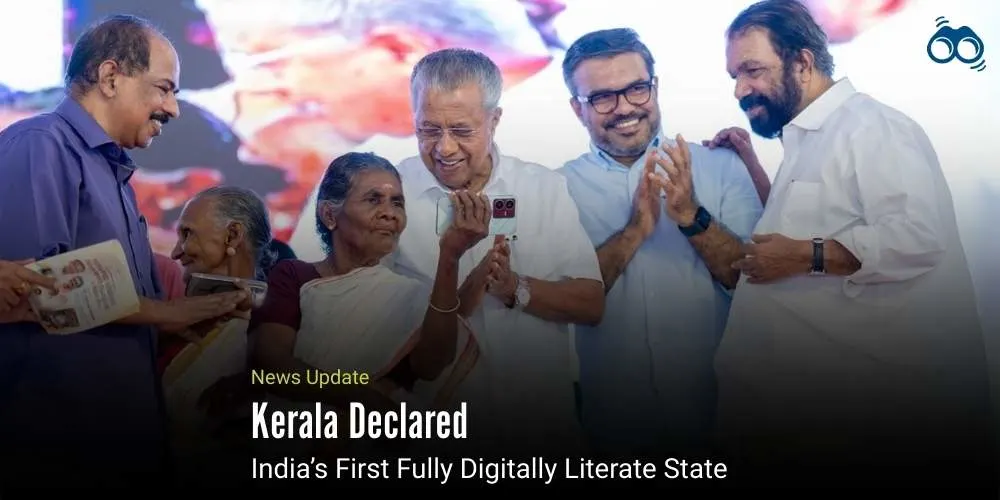Kerala Empowers Millions Through Digital Literacy, Including Learners Over 100
Kerala Achieves 100% Digital Literacy, Urges Replication Across India
Kerala Chief Minister Pinarayi Vijayan, while speaking at an event in Thiruvananthapuram on 21 August, announced that the state had become the first in India to achieve complete digital literacy. The declaration followed the successful completion of the ‘Digi Keralam’ campaign, which had been launched by the Local Self-Government Department (LSGD) to identify individuals lacking digital skills and train them in smartphone usage and access to government services. During the ceremony, the Chief Minister reportedly interacted via video call with 105-year-old MA Abdullah Moulavi Baqafi, a former imam described as one of the oldest learners under the initiative. He was also said to have taken selfies with two elderly women who had gone on to serve as ambassadors of the campaign.
Officials noted that Kerala’s achievement stood out in the national context, given that only 38 per cent of India’s population was considered digitally literate by current standards. They added that Kerala had now joined a select group of global regions that had achieved universal digital literacy across all age groups.
It was reported that the campaign had surveyed over 83.45 lakh households across both rural and urban local bodies. Of these, more than 21.87 lakh individuals had been identified as digitally illiterate, with 99.98 per cent of them successfully trained and evaluated. Authorities highlighted that over 15,000 of those trained were aged above 90, with some learners even crossing the age of 100. The training was said to have followed a three-part digital literacy module aligned with Union government guidelines. Participants were taught basic smartphone operations, saving contacts, making calls, sending voice messages via WhatsApp, accessing platforms such as YouTube and Google Search, and making online payments for utilities, including LPG and electricity. The curriculum had reportedly received certification from UNESCO, lending international credibility to the programme.
The campaign was described as a massive community effort, with over 2.57 lakh volunteers engaged in enrolment and training. These included members of the NSS, NCC, NYK, Kudumbashree personnel, SC/ST promoters, library council members, and students from schools and colleges. Training was conducted through door-to-door visits, workshops, and digital camps, ensuring that even the most marginalised groups were reached. Officials explained that the campaign had drawn inspiration from Pullampara panchayat in Thiruvananthapuram district, which had earlier succeeded in training all its residents in basic digital literacy. The model developed there during the COVID-19 lockdown had reportedly been replicated across the state. Anecdotes such as that of Sarassu, a 69-year-old daily wage labourer who went on to create her own YouTube channel, were cited as examples of grassroots transformation.
Socioeconomic Impact The Chief Minister observed that the campaign had enabled large sections of the population, particularly the elderly, women, and marginalised communities, to pay bills online, access government e-services, and connect with others via social media. Officials added that the initiative had fostered economic independence, civic participation, and digital inclusion. It was further suggested that Kerala’s model could serve as a blueprint for other Indian states, especially those with low digital penetration. The campaign was seen as a precedent for inclusive digital governance, combining state policy with community mobilisation. Kerala’s digital literacy milestone was not merely a technological achievement but a testament to participatory governance, social equity, and the transformative power of collective effort.
Editor’s Note
Kerala’s declaration as India’s first fully digitally literate state marks a significant milestone in inclusive governance and public empowerment. This achievement was made possible through the successful implementation of the ‘Digi Keralam’ campaign, a state-wide initiative launched by the Local Self-Government Department to identify and train individuals lacking basic digital skills. The campaign followed a structured approach inspired by the Pullampara panchayat model, which had earlier demonstrated that universal digital literacy was achievable at the community level. Kerala scaled this model across all districts, combining government planning with grassroots mobilisation. Over 83 lakh households were surveyed, and more than 21 lakh digitally illiterate individuals were trained—99.98 per cent of whom cleared the final evaluations. Notably, the campaign reached thousands of elderly citizens, including those above the age of 90.
Training was based on a three-part module aligned with Union government guidelines and certified by UNESCO. It covered essential smartphone operations, online payments, and access to digital platforms and government services. The campaign’s success was driven by over 2.57 lakh volunteers, including students, community workers, and local promoters, who ensured wide participation and accessibility. Kerala’s strategy combined local innovation, inclusive outreach, and structured pedagogy. Other states can learn from its emphasis on community engagement, age-inclusive training, and the integration of digital literacy with everyday public services. The Pullampara model, now proven at scale, offers a replicable framework for bridging digital divides across India.
Skoobuzz underlines that Kerala’s achievement is a technological advancement and a social commitment to ensuring that no citizen is left behind in the digital age.














0 Comments (Please Login To Continue)